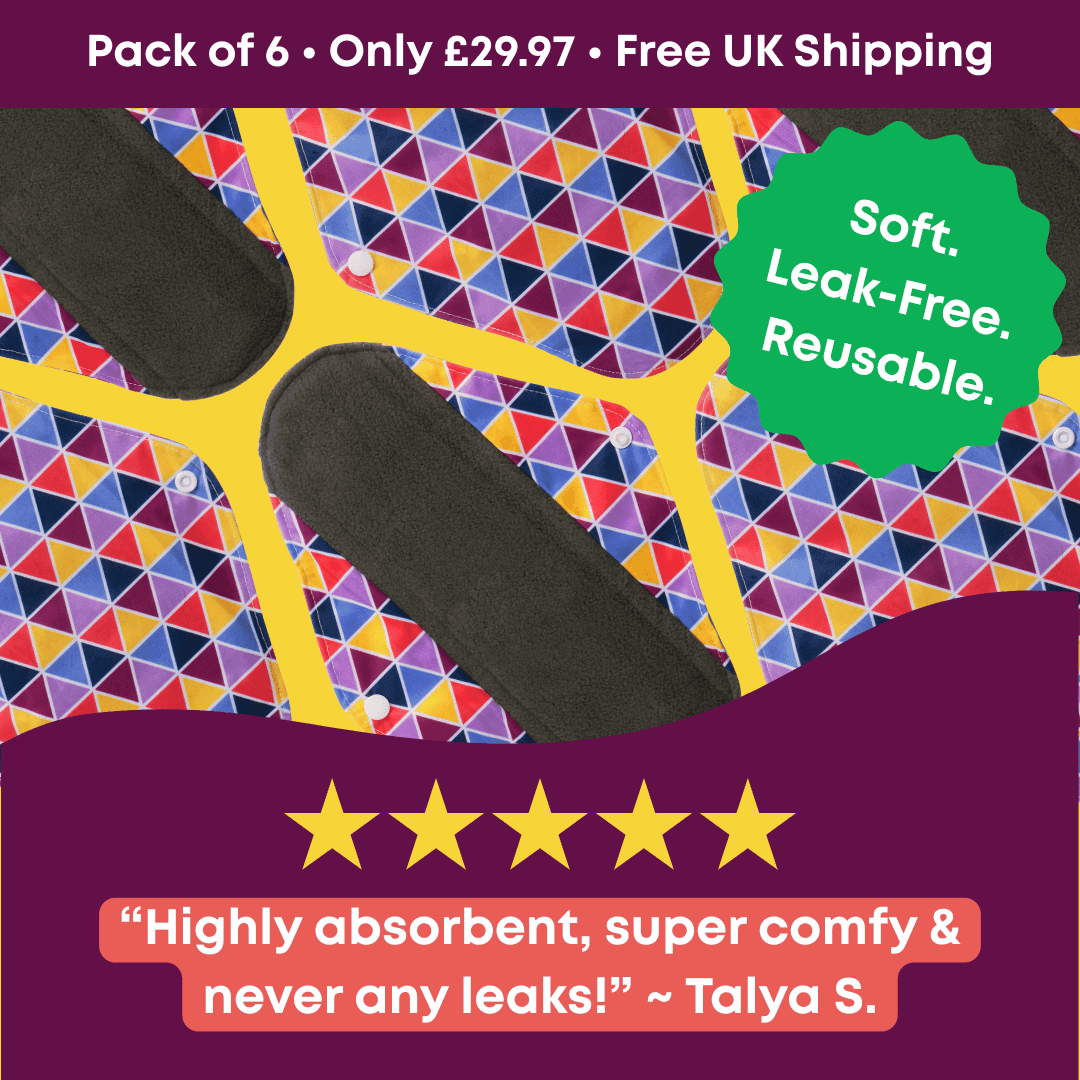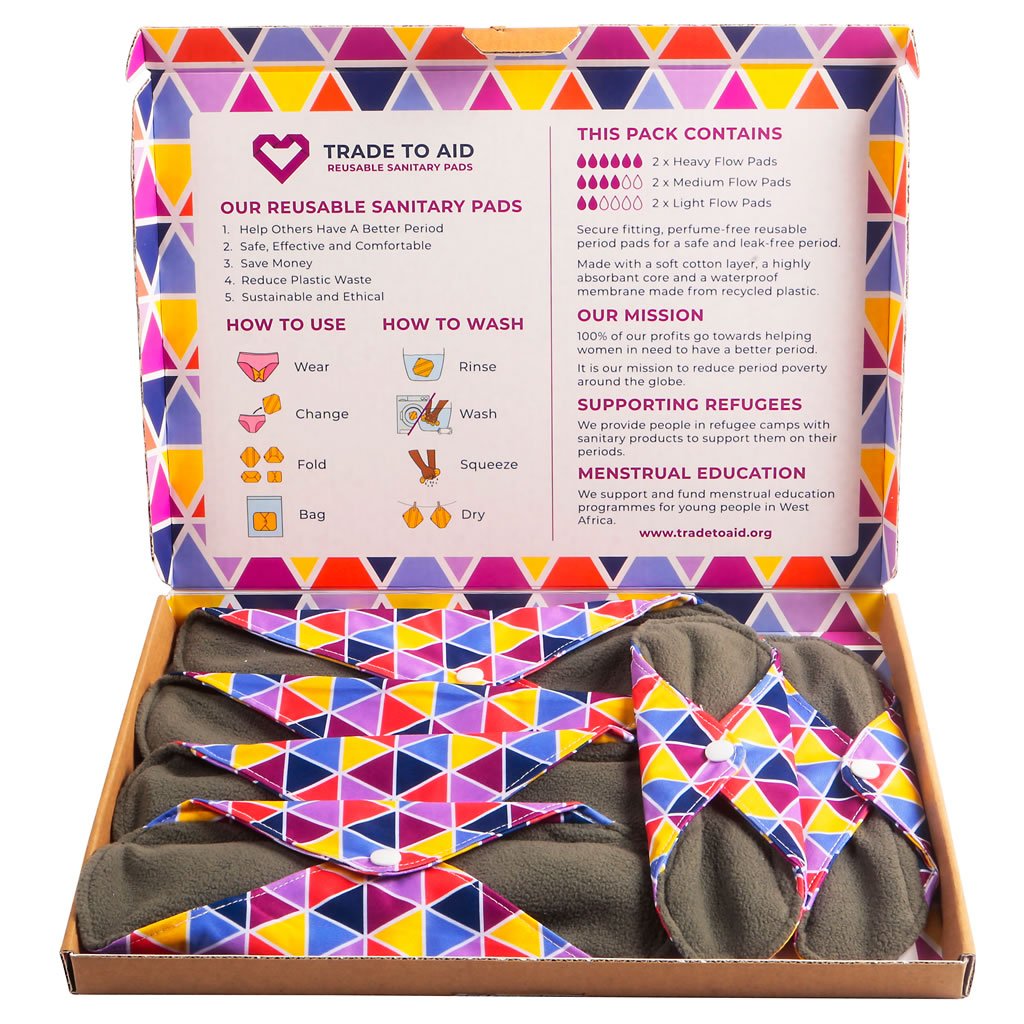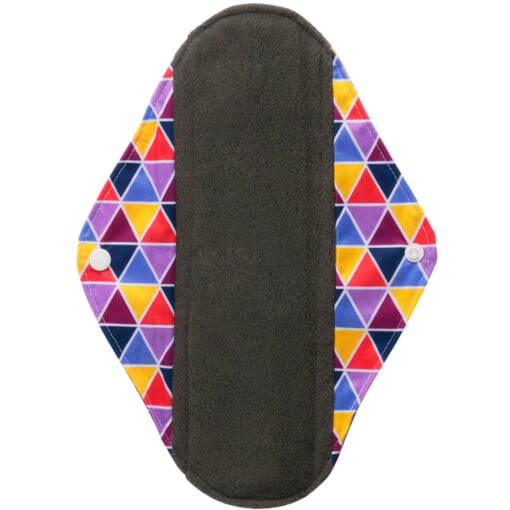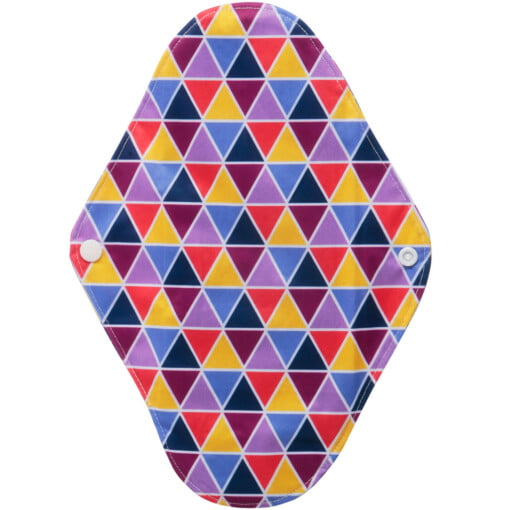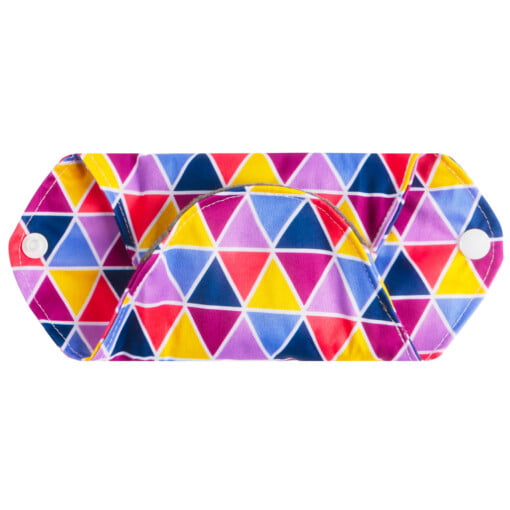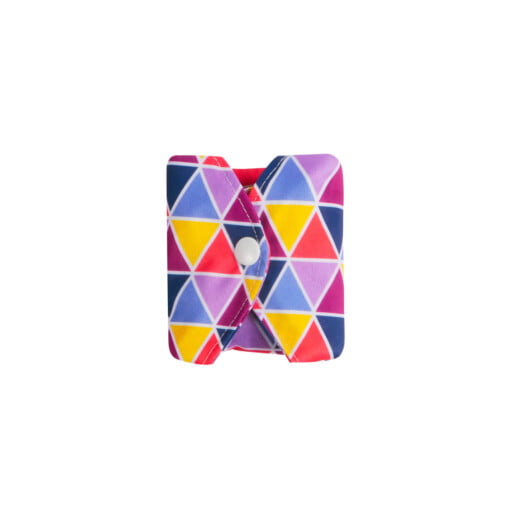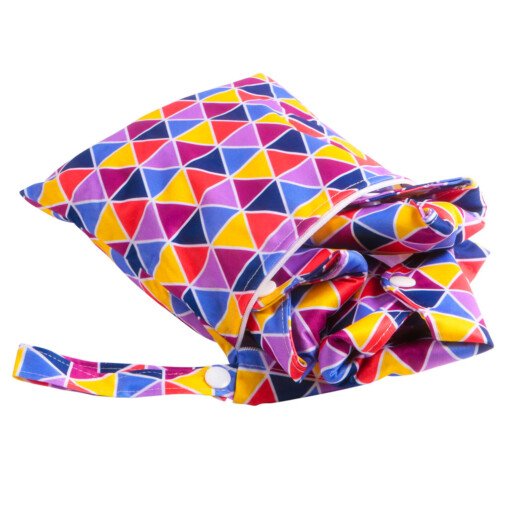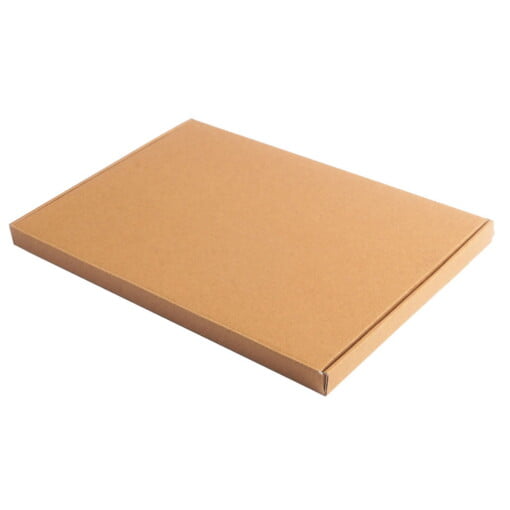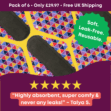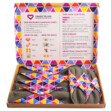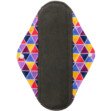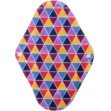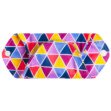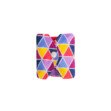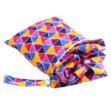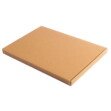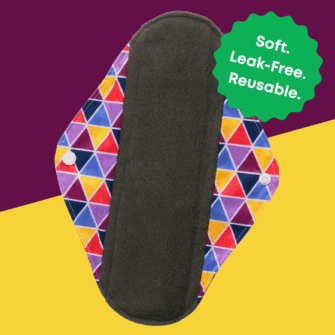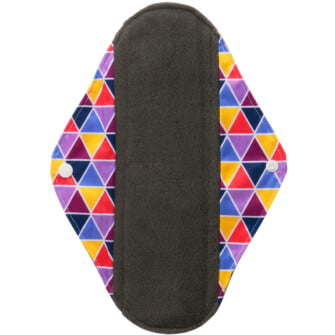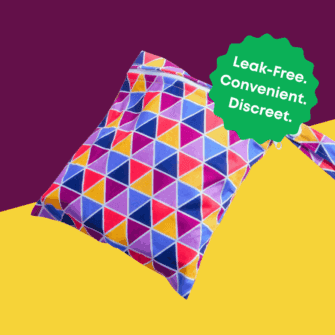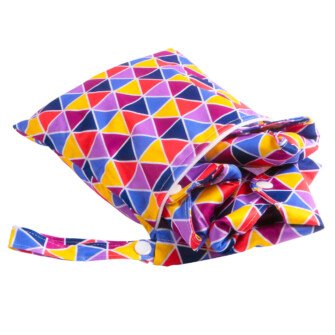Reusable Sanitary Pads (Pack of 6)
£38.50 Original price was: £38.50.£29.97Current price is: £29.97.
Ultra-Soft. Leak-Free. Life-Changing.
Our reusable period pads are made with high-quality bamboo charcoal and a leak-proof layer of recycled plastic—for a period that’s soft on your body and kind to the planet.
💸 Save money on period care
♻️ Reduce waste with every use
💖 Help others with every purchase
For every pack you buy, we donate a pack to a refugee in need.
You’re not just buying pads—you’re changing lives.
Includes: two light pads, two medium pads, two heavy pads, one waterproof wet bag
Get £5 off your first order with code FIRSTORDER!
- 30 Day Satisfaction Guarantee - free returns - no questions asked!
- All orders sent in discreet packaging.
- Try our reusable pads and help another woman have a better period.

SOCIAL ENTERPRISE
Period poverty is a global issue that we need to tackle, not tomorrow, but now. Trade To Aid is dedicated to helping women and girls in need. For every pack of pads you buy, we will donate one to women and girls in need.

ECO-FRIENDLY
Since you can wash and reuse the pads for years, they’re so much better for the environment than disposable pads that end up in landfill or pollute the oceans. Reusable pads are sustainable and eco-friendly.

RECYCLED PLASTIC
The waterproof membrane on our reusable pads are made from 100% recycled plastic. Reusable pads reduce your plastic footprint.

NATURAL MATERIALS
Our reusable pads are constructed from natural bamboo charcoal. It’s free from the synthetic additives and nasty chemicals found in disposable pads. Reusable pads are kind to you and your body!
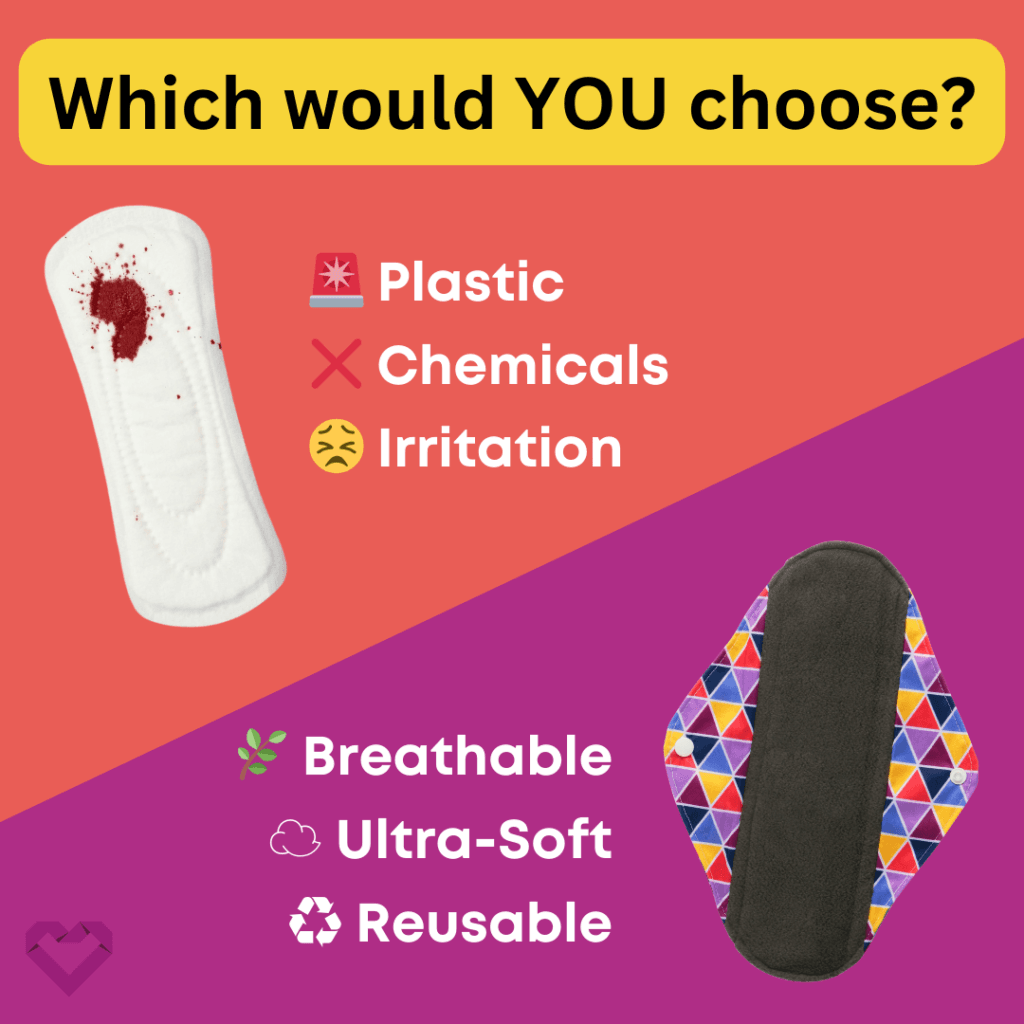
Which will you choose?
Most disposable pads are made with plastic, synthetic fibres, and harsh chemicals that can cause irritation—and they take over 500 years to break down.
Our reusable pads are a gentler choice:
🌿 Breathable, ultra-soft bamboo charcoal
♻️ Designed to reduce waste and save you money
💖 Comfortable, secure, and better for your body
Make the switch to pads that work with your body—not against it.
🌳 And for every order, we plant one tree—so you’re caring for the planet while caring for yourself.
What’s included in each pack of our reusable sanitary pads?
Our packs of reusable sanitary pads include:
- Two light flow pads
- Two medium flow pads
- Two heavy flow pads
- One waterproof wet bag
Plus, for every pack of reusable pads you buy from Trade To Aid, we donate a pack to a refugee in need of period products.
Any other profits are dedicated to menstrual education programmes in West Africa. We’re improving awareness of what periods are, and eliminating taboo and stigma.
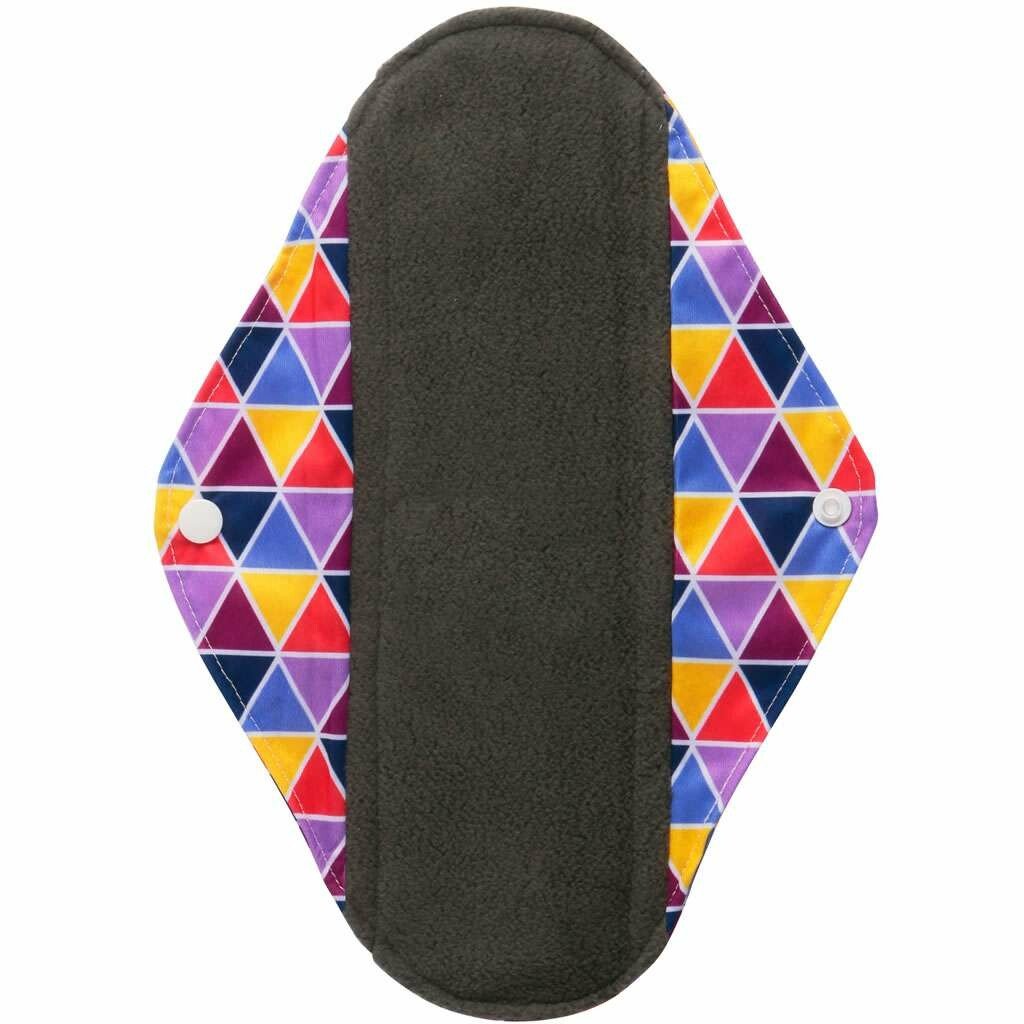

Our Commitment To The Planet
We plant one tree for every order through our partner Ecologi, helping to restore ecosystems and absorb more CO₂ than each delivery creates. We power our operations with renewables, offset remaining transport emissions, and avoid plastic wherever possible.
Why Choose Trade To Aid Reusable Sanitary Pads?
🌿 Eco-Friendly & Sustainable: Embrace a greener period with our washable pads, designed to last for years. By choosing our reusable pads, you’re helping to eliminate the waste of disposable products that contribute to landfill and ocean pollution.
❤️ Buy One, Give One: With every pack you purchase, we donate another to refugees in desperate need of period products. It’s not just a pad; it’s a lifeline. Your choice supports women and girls globally, tackling period poverty head-on.
🌍 Ethical & Natural: Our pads are made from bamboo charcoal, known for its natural, absorbent properties, without the harsh chemicals found in disposables. The waterproof layer is thoughtfully made from 100% recycled plastic, making your period routine both ethical and environmentally responsible.
Why Make the Switch?
Switching to Trade To Aid Reusable Sanitary Pads is a powerful decision. It’s a choice that’s kind to your body, sparing it from the synthetics and chemicals in disposables. It’s kind to the planet, dramatically reducing your waste and plastic footprint. Most importantly, it’s kind to fellow women and girls who need support. Together, we can end period poverty and make a lasting impact.
Embrace a period solution that cares for you, others, and the earth. With Trade To Aid, every cycle is an opportunity to contribute to a more sustainable and equitable world. Join us in the movement towards a more mindful menstruation.
Why Use Reusable Pads?
Thinking of switching to reusable sanitary pads for your period? Awesome! Reusable sanitary pads are kind to your body. They’re also kind to the environment and vastly reduce the numbers of disposable period products that end up in landfill or the oceans.
Switching to reusable sanitary pads will also help us end period poverty together.
Here are a few reasons to make the switch to reusable pads:
Reusable pads vastly decrease plastic waste. A woman may go through some 10,000 to 15,000 pads in her lifetime. Most of these pads end up in landfill or the oceans, and then there is the plastic packaging to take into account too. Disposable pads are the 5th most common item washed up on UK beaches and worldwide, they contribute millions of tons of waste to landfill.
Since they’re often made from plastic fibres, disposable pads have very poor biodegradability and contain harmful chemicals which seep out when they’re wet.
Reusable pads will last 5 years or more and vastly lower your carbon footprint and contribution to landfill. Trade to Aid’s reusable pads are made from recycled plastic and we pay rigorous attention to the sustainability of ourselves and our suppliers.
The average woman in the UK spends some £13 a month minimum on sanitary products. That works out to over £1,500 over a 10-year period. For some living in period poverty, the ongoing monthly costs of disposable products simply prove too much. Many women and girls resort to improvising using toilet roll, rags or worse.
The disposable nature of standard commercial sanitary products keeps you in the pocket of main brands and their huge multi-billion dollar industries.
Reusable pads are much, much cheaper than disposable products. They mean that you are in greater control of the costs of your period. Instead of repeatedly buying packs of disposable pads throughout life, you’ll have one or two sets of high-quality reusable pads.
Our reusable pads will save you a lot of money even in just a year. For many living in period poverty, this is a real lifeline.
Made of soft bamboo charcoal, our reusable pads are more absorbent than typical disposable pads. We provide 3 versions for different flows; light, medium and heavy. The wicking technology rapidly wicks blood away from your body leaving you feeling dry – they’ll protect you through thick and thin. They also do not contain potentially harmful synthetic chemicals found in disposable products.
Disposable sanitary products have been found to contain numerous known carcinogens and other chemicals known to cause skin irritation. Many of these seep out when they get wet.
Trade to Aid’s reusable pads are comfortable and free-from harmful synthetic chemicals. They perform better than the average disposable pad too. We are not trying to reinvent the wheel – our reusable pads work in broadly the same way as disposable pads, but they are safer and more comfortable for you and your body.
Safe, effective and comfortable to wear, reusable pads beat disposable pads hands-down when it comes to wearing them.
High cost and low access to proper sanitary products can cause period poverty. Period poverty is where women and girls cannot afford the sanitary products that most of us take for granted. This is a public health crisis that affects millions of girls and women across the world, not just in developing countries, but across the UK, Europe and the US too.
It’s time to tackle period poverty. By switching to reusable pads, you will help us tackle period poverty together.
Trade to Aid is a non-profit organisation. For every pack of pads you buy from us, we donate one set to a refugee in need. Plus, all of our profits will be used to fund menstrual education for children in West Africa.
Our aim is to provide a sustainable solution to the issue of period poverty. We use all our profits to donate pads to women and girls in desperate need of sanitary products, and we also provide menstrual education for school children to ensure a better understanding of periods and to eliminate the taboos surrounding them.
Access to sanitary products and menstrual education are the two main routes to ending period poverty – Trade to Aid is committed to both.
We care about the people making our pads and we make sure all our suppliers follow the Fair Labor Association’s Code Of Conduct. We perform annual inspections of their factories and offset the carbon footprint of transportation.
FAQs
Reusable pads work in pretty much the same way as disposable pads, with the crucial difference that you don’t throw them away after use. This means that they are cheaper and more environmentally-friendly than conventional pads.
They affix to your underwear via 2 small clips that are attached to the wings. They are at least as absorbent as disposable pads, so you’ll know how many you’ll need each day and how often you’ll need to change them. You may have to adjust this slightly as they are usually more absorbent, though, so you’ll need fewer.
Once you’re finished with a reusable pad, you can remove it and fold it up. The clips will allow you to clip it together securely. You can then place it in a sealable waterproof bag (included with Trade To Aid reusable pads).
When you’re ready, simply follow the guidelines for how to wash the pad. Once you get used to washing them, they’ll serve you well for many years – you’ll wonder why you didn’t make the switch sooner!
We sell our reusable pads in packs of 6 pads. Each pack contains two light flow pads, two medium flow pads, two heavy flow pads, and one waterproof wet bag.
Depending on your flow and how frequently you want to be washing your pads, it’s possible to manage with 6 pads. However, with just 6 pads, you will likely need to be washing your pads daily.
We recommend starting with a pack of 6 pads to try them out. Once you love them, then expand your reusuable pad collection and come back for more!
Reusable pads are often more absorbent than disposable pads. But, it’s best to grab the same quantity of pads that you’ll normally use, and then you’ll need to further increase that to accommodate for washing times between uses.
If you wash your pads every other day, you’ll need to double your usual pads. This means you’ll be washing your used pads every 2 days – you’ll use the clean pads whilst the used ones are in the wash.
If you think you’ll struggle to wash them every other day, then you’ll need to triple your normal pads. That might seem like a lot – you could need up to 20 pads just to be safe during exceptionally heavy flow or longer cycles – but remember, this is a one-off cost!
In the long term, it works out vastly cheaper than disposable pads.
We recommend 12 – 18 pads on average.
You’ll need to change your reusable pads roughly as regularly as your disposable pads.
Depending on flow, you’re probably looking at a maximum of 6 changes a day.
Trade To Aid’s reusable pads come in 3 different thicknesses; light, medium and heavy. This should keep the number of pads you’ll need down, as you’ll be able to switch to a thicker pad if your flow increases and switch back down when it decreases.
You should be able to tell when the pad feels moist or wet against your skin.
- It’s first recommended that you let reusable pads soak in cold water for at least 30-minutes after use. This will lift out any bloodstains. You can mix in some tea-tree oil or a small amount of hydrogen peroxide (a mild cleanser).
- Once soaked, you can throw the pads in a normal 40-degree wash. Do not use softener as this can affect the absorbance of the pads and only use very light detergent. Higher heats (60 degrees) may seem like a good idea but these can ‘set in’ any remaining bloodstains.
- Dry your washed pads on a washing line, or by a windowsill with a breeze and preferably in bright sunlight. In colder weather, dry them by a radiator. The most important thing is that they dry relatively quickly and thoroughly. Remember that they are designed to be absorbent so will need more drying time than most clothes. Make sure they are bone-dry before re-using them.
Yes, all reusable pads are suitable for both day and night time use.
Trade To Aid offers 3 different thicknesses of pads, so you’ll be able to select the right one for nighttime use.
They’re all soft on the skin with fleece cotton, so are super comfy to wear through the night!
In between washes, you can store your reusable pads in a waterproof bag (included with our pads).
Simply drop them in the bag and seal it up.
Washed pads can be stored anywhere dry where you’ll normally store other clothes.
Yes, that’s absolutely fine.
It’s totally fine to throw your reusable pads in with your regular coloured laundry, so long as you soak or rinse them first.
You cannot tumble dry reusable period pads. They have plastic clips that could become warped and damaged, and tumble drying can damage the absorbent material.
Air-dry your pads on a washing line where possible. In the winter, you can place them on a drying rack inside next to a radiator. The most important thing is that they dry thoroughly and as quickly as possible.
Yes, so long as you wash them correctly and let them dry thoroughly, they are absolutely hygienic!
They’re also made from natural cotton fibre, not synthetic materials like disposable pads. That makes them kinder to your skin.
If you rinse and wash your reusable pads properly then they shouldn’t stain much. But, due to the nature of sanitary pads, some levels of stains are unavoidable after a while!
To reduce stains, make sure you soak your reusable pads in cold water prior to washing. 30 minutes should do the trick, but if you can soak them overnight then that’s ideal.
You can add tea tree oil, hydrogen peroxide, white vinegar or baking soda to the soaking mixture to help remove stains.
Blood is strongly pigmented – it’s very stubborn – but it isn’t harmful and doesn’t mean your reusable pads are dirty at all – so long as you wash them properly!
Reusable sanitary pads are as well-sealed and safe as any disposable pads.
During heavier flow, you can switch to a thicker pad.
Yes, it’s always recommended you wash the rinse the pads prior to first use.
Yes, we accept no-hassle returns for 30 days from the sale date provided the pads are totally unused.
| Weight | 0.75 kg |
|---|---|
| Dimensions | 35 × 25 × 2.5 cm |
My daughter loves these and it can be reused time and time again
excellent very absorbent
Love the feel but they are too wide for my underpants (Hanes cotton old fashioned underwear) such that they bunch up. Do you make ones that are narrower?
I won a set of these through another site. I wasn't too sure at first having never used reusable pads before. However having used them I'm really impressed. I found that when using them my period was significantly lighter. They also wash really well even at a low temperature and all the stains came out.
I love my reusable pads, it makes you feel fresher than the disposables and when you wash them , they wash well.
They don’t stick to your lady parts like the sticky bits on disposables do as well.
Overall these are fantastic. Definitely will be always using them.
Related products
Sanitary Pads
Sanitary Pads
Sanitary Pads

